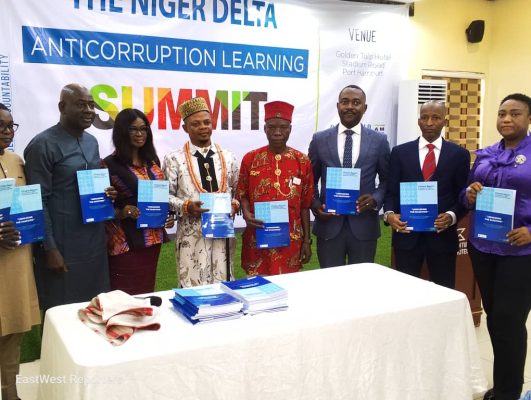Stakeholders at the 2025 Niger Delta Anti-Corruption Learning Summit have called for decisive action to stop the use of state resources by governors to sponsor political parties. According to them, the misuse of public funds for partisan interests undermines democratic governance and perpetuates impunity.
The summit, held in Port Harcourt, Rivers State, was themed “Building Stakeholders’ Resilience for Sustained Accountability and Development in the Niger Delta.” Convened by the Social Development Integrated Centre (Social Action), the event gathered civil society organisations, traditional rulers, students, anti-corruption agencies including the EFCC and ICPC, and various non-governmental organisations to address the pressing governance issues facing the oil-rich region.
In his opening remarks, Executive Director of Social Action, Isaac Osuoka, strongly criticised the political landscape in Rivers State, referring to it as the “epicentre of godfatherism” in the country.
“Rivers State has become the epicentre of godfatherism in Nigeria. It is undermining democracy,” Osuoka declared. “Since 1999, it has become a trend that every governor of Rivers State becomes a financier of the ruling party, whether PDP or APC. State resources are used to fund elections, often contributing to electoral malpractices across Nigeria more than any other state.”
A major highlight of the summit was the recommendation to institutionalise a needs-based assessment framework for federal constituency projects. Stakeholders proposed forming community-based committees to monitor and ensure transparency in the execution of development projects, aligning them with local needs.
Environmental rights advocate Celestine Akpobari stressed the importance of identifying actual community needs before implementing projects.
“The current system, where lawmakers control constituency projects, is highly susceptible to abuse. We need community committees to take charge, ensuring transparency and that projects align with grassroots needs,” Akpobari said.
Constance Meju, Coordinator of the Centre for Media Environment and Development Communication, added her voice to the call for judicial reform. She lamented the erosion of judicial integrity and criticised the selective application of justice in corruption cases.
“The judiciary must be held to a higher standard of accountability. The fight against corruption cannot be won if our justice system continues to treat high-profile offenders with kid gloves,” Meju stated.
The summit concluded with a strong call for sustained citizen engagement, reinforced oversight mechanisms, and collective action to drive transparent and accountable governance across the Niger Delta.


